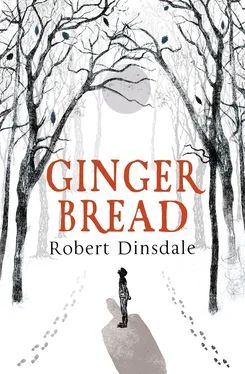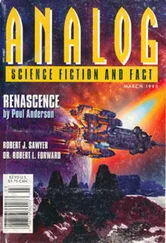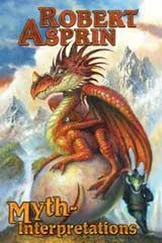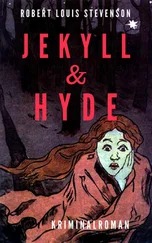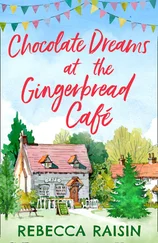1 ...7 8 9 11 12 13 ...20 The boy has closed his eyes to sleep, with Grandfather retreating down the hall, when he realizes he is still wrapped up in mama’s shawl. He has to be careful because one day the smell will wear out, so he takes it off and makes a nest in the corner. Then he plucks the Russian horse from the ledge and settles him down in the nest for sleep.
Outside, tiny crystals of snow are twirling on the wind. In the ragged orange of one of the streetlamps a man is hunched over Grandfather’s car. With the door half open, the man rifles inside. But he finds nothing, and then he is gone, leaving the door ajar and the snow curling through.
The boy steals back to bed, whispers goodnight to the Russian horse, and closes his eyes. It blocks out the glow of the streetlamps, but it does not block out the strange, muted whimpers coming from along the hall.
In the morning they have to dress up warm, because it’s winter and today is a day out. There are mittens and scarves that mama made, and big black boots two sizes too big. As Grandfather works them onto the boy’s feet, he tries to find answers in the lines of the old man’s face, but it is hard grappling for an answer when the question remains so out of grasp.
‘Are you going to be okay, papa?’
The last boot goes on, and Grandfather looks up with furrowed eyes. His face is not scored with the same deep crevices as the night before, but this the boy does not brood on, because the night has a kind of magic and makes things all better by morning.
‘Okay?’
‘To go into the forest.’
In response, Grandfather lifts a hat from the edge of the rocking chair and lowers it over his head. It is a ring of brown and black that, so it is said, is made out of bear.
‘We have to do it for mama, don’t we?’
Grandfather nods, with steeliness in his eyes of blue.
The car, Grandfather finds, has been open all night. Snow ices the seats and the steering wheel is rimed in hoarfrost, so that when the boy crawls inside he is colder than he was outside. In his lap sits the little Russian horse – because mama must say goodbye to that poor wooden creature too – and underneath him, his eiderdown for a blanket. It is, Grandfather says, going to be bitter and cold before they are through.
‘Do you know the way, papa?’
Grandfather says, ‘I think I remember.’
‘So you’ve been there before?’
‘Oh, long, long ago, when we did not exist, when perhaps our great-grandfathers were not in the world …’
If it seems like a story is about to begin, it quickly turns to mist. Grandfather scrubs a hole in the windscreen and squints out. ‘The winter might be against us, but you’ve the stomach for an adventure, don’t you, boy?’
It thrills the boy when Grandfather says this, because the boy has never had an adventure, not a proper adventure of the kind he thinks Grandfather must once have had. Those photographs in the tenement spell out a kind of story, and perhaps he would find it as heroic as the fables Grandfather tells, if only he knew how to read it.
‘What if we get hungry?’
Grandfather pats his pockets. ‘I brought us wings of the angel .’
The city streets are banked in grey slush. This snow, Grandfather says, is not for settling. That Grandfather is not always correct is quickly apparent, for once they have left the austere tenements behind, the drifts grow high at the banks and the blacktops are encased in ice as thick as a river.
It is frightening to leave the city. The city is school and the tenement and the miles and miles of empty factories where the boy is forbidden to play. In places, the boy knows, the forests have crept into the city itself, as if all of the streets and squares are held in a giant fist of pines, but outside there is nothing but the dark curtain of woodland and the barren heaths in between. The road weaves across them like an open white vein.
For miles the road is bordered by banks of firs but, deeper in, the trees are older still: sprawling oaks and beech, alders and ash. Once in a while an oak towers over the rest, and those oaks have stories and names all of their own. Somewhere, so deep that Grandfather says it might lie in some other country, stands the plague tree, whose branches cradled an ancient king while death ravaged his kingdom. There are oaks named after battles and tsars and emperors whose empires have long since ceased to exist, but these the boy knows he will never see, for the forest stretches until the very end of the earth and, if you follow its paths, you can never come back home. It would, he knows, be a very great adventure to see the edge of the forest; but mama is gone, and the boy has made a promise: he will not leave Grandfather to drink milk in the tenement alone.
They have gone many miles from the tenement when Grandfather pushes his old jackboot to the floor and turns the car onto a forest track. The branches above, laden with snow, have formed a cavernous roof, so that the trail here is almost naked, only lightly dusted with crystals of frost.
The boy chews his mittens off his hands and suckles on each finger for warmth.
‘Are you so hungry?’
‘No.’
‘We should have brought soup.’
‘I don’t like soup.’
‘You liked your mama’s kapusta .’
‘Which one is that?’
‘Cabbage,’ the old man beams.
There is a long silence.
‘I didn’t like it,’ the boy finally whispers, his head bowed. ‘I only told her I liked it.’
‘Why?’
‘She liked to make it for me, didn’t she, papa?’
‘I’ll make you some.’
‘Not like mama.’
‘No,’ Grandfather whispers, ‘not like mama.’
When they are deep in the wood, Grandfather slows the car. The windows are frosting again on the inside and he rubs them with his sleeve to make sure he can see the trail. ‘It must be somewhere near,’ he says.
‘Here?’
There is a trembling in Grandfather’s voice; it might be fancy, but he thinks it is because of more than the cold. The boy watches him, but Grandfather is hunched over the wheel, squinting through the ever-decreasing hole in the windscreen, and betrays not a flicker. He guides the car to the very edge of the track, cutting the engine before they’ve stopped rolling.
‘Come on, boy. We’ll know it when we see it.’
It is easy, now, to see why Grandfather did not want to come to the forest. The trees have the visages of men. They leer, and grope, and they surround. Colonies of birds with watchful black eyes line the treetops.
When he climbs out of the car, the frost is the first thing to assault him; the trees simply stay where they are, watching , and for a moment that is the most terrible thing of all. Grandfather waits between the trees, and by the time the boy catches up his face has blanched as white as the ice-bound branches around.
‘Are you okay, papa?’
‘You don’t have to keep asking, boy. We’ll see it done and then be off home.’
They set off, Grandfather – in his eagerness to see it done – always two strides ahead. The trail leads them into darker reaches of the woodland, but everywhere shimmers with the same kind of spectral light, the sunlight trapped beneath the branches by a canopy of snow. This forest they walk in is a graveyard, and fitting perhaps for mama’s end.
‘The urn!’ Grandfather mutters, opening his empty hands. ‘Stay here.’
He sweeps around and, with shoulders hunched up, barrels back down the trail.
Now the boy is alone. He stands in the middle of the track and watches his breath rise. The tips of his ears and the end of his nose tingle. He has never heard silence quite like this. He thinks that, if he coughed, it would break some secret forest rule. It would be so loud the blackbirds would scatter from their roosts and the wild cats come hurtling from their hidings.
Читать дальше
